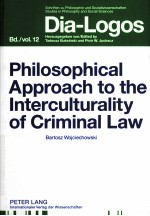
- 作 者:BARTOSZ WOJCIECHOWSKI
- 出 版 社:PETER LANG
- 出版年份:2010
- ISBN:3631605854
- 标注页数:312 页
- PDF页数:316 页
请阅读订购服务说明与试读!
订购服务说明
1、本站所有的书默认都是PDF格式,该格式图书只能阅读和打印,不能再次编辑。
2、除分上下册或者多册的情况下,一般PDF页数一定要大于标注页数才建议下单购买。【本资源316 ≥312页】
图书下载及付费说明
1、所有的电子图书为PDF格式,支持电脑、手机、平板等各类电子设备阅读;可以任意拷贝文件到不同的阅读设备里进行阅读。
2、电子图书在提交订单后一般半小时内处理完成,最晚48小时内处理完成。(非工作日购买会延迟)
3、所有的电子图书都是原书直接扫描方式制作而成。
Gratitude 7
Introduction 9
Chapter Ⅰ.The idea of pluralism and human rights in democratic multi-cultural societies 19
1.Between the Scylla and Charibdis of cultural relativism 19
2.Cosmopolitanism: The philosophy of world citizenship 25
3.Ronald Dworkin’s right of equal treatment as the basis of liberal plu-ralistic society 32
4.Human rights as the nature of intercultural consensus 38
4.1.Human rights - the creation of "Western" imperialism? 39
4.2.Human dignity as the basis of human rights 45
5.Democracy in the globalization age 52
5.1.Democracy in the 21st century 52
5.2.Are democracy and human rights compatible? 60
Chapter Ⅱ.Discursive - ethical justification of human rights and democracy 64
1.The Ethics of Discourse in Karl-Otto Apel’s Transcendental-Pragmatic Philosophy 64
1.1.The basis of discourse ethics 65
1.2.Universalistic ethics of co-responsibility 69
2.Jurgen Habermas’ theory of discursive reconstruction of law 80
2.1.The role of procedural communicative rationality in justification of law 81
2.2.Communicative reinforcement of democracy - deliberative policy 90
3.Main assumptions of Robert Alexy’s legal argumentation 103
3.1.The theory of discourse and human rights in Alexy’s philosophy of law 105
3.2.Direct and indirect patterns of discursive justification of human rights 110
4.Critical character of discourse theory 119
Chapter Ⅲ.The principle of mutual recognition as a condition of inter-cultural legal discourse 121
1.Philosophical roots of the theory of recognition 121
1.1.Interpersonal character of human relations in Fichte’s idea of law 121
1.2.Mutual recognition in Hegel’s philosophy of law 125
2.General assumptions of the modern theory of recognition 132
3.Patterns of intersubjective recognition: Axel Honneth’s moral grammar of social conflicts 136
3.1.Love and the fight for recognition 136
3.2.The fight for recognition in the sphere of modem law 138
3.3.The role of social respect in shaping mutual recognition 147
3.4.The principle of mutual recognition and the rules of discourse as constitutive elements for political and legal constructivist com-munity 152
Chapter Ⅳ.Punishing as a negative reaction to illegal acts 175
1.The notion and justification of punishment in an inclusive constructivist community 175
1.1.Constmctivist community as an exponent of the openness of de-mocratic society 176
1.2.Punishment as a manifestation of standard social practice 183
2.Double justification of punishment in Hegel’s philosophy of law 188
2.1.Argument from one’s right 189
2.2.Argument from the relation of mutual recognition 191
3.Participation in communicative activities and responsibility 196
4.The protection of interaction processes in the light of criminal law 199
5.Changing roles between the victim and the offender, and the justification of punishment 207
6.Relation of criminal law to morality 214
Chapter Ⅴ.Punishing as a condition of maintaining social balance 226
1.Punishment as the restoration of balance 226
2.Public reaction to the evil in the form of condemning the offender 235
3.Punishment as a means of restoring the relation of mutual recognition 243
3.1.Penal consequences of infringing the principle of mutual recognition 244
3.2.Is the act of committing a crime a condition to exclude an offender from the community? 249
4.Punishment as a message for society 264
5.Interculturaland international penal law 266
5.1.Notional relation of "intercultural" and "international" law 268
5.2.The idea of the "end of impunity" 277
Conclusion 284
Literature 293
